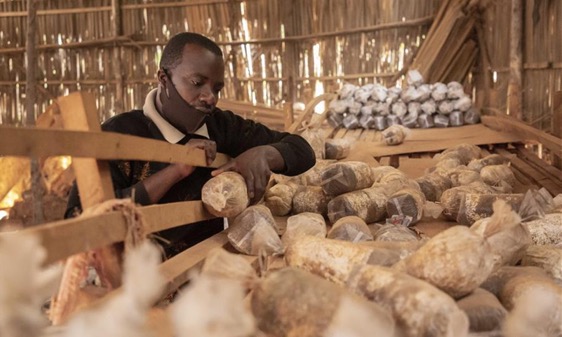Environment and energy infrastructure a centerpiece of China-Africa cooperation

Agriculture

Agriculture is one of the most important economic sectors for the continent, employing the majority of the population and accounting for 14 percent of GDP in sub-Saharan Africa, according to a report by Oxford Business Group, a global research and advisory company.
Since 2011, the Chinese government has been promoting green agricultural technology in Africa and training talents by building agricultural technology demonstration centers, dispatching experts, and providing scholarships for African students studying in China.
For example, Juncao technology, which can be used for producing mushroom animal feed, and biomass fuel, has been promoted in Rwanda to help local people gain access to healthy food sources and improve their livelihoods.
The technology does not use arable land, and it is low-cost, easy to operate and environmentally friendly. Moreover, when used to produce clean energy, Juncao can effectively help address the challenges of climate change, because it has a high conversion rate of solar energy.
"The power generated from the burning of Juncao grown on one hectare of land is equivalent to that from more than 50 tons of coal. A ton of dried jumbo Juncao can produce over 450 cubic meters of biogas. Since the amount of CO2 that Juncao absorbs during its growth offsets the amount it emits in burning, it has zero emission and zero pollution and is, thus, a source of clean energy that can help address the challenges of climate change," said then-Ambassador Liu Jieyi.
Chinese experts in Rwanda said that mushrooms turn a profit quicker than traditional crops grown in the country, earning as much as 80,500 Rwandan francs (about $100) per square meter after just eight days, compared to six months needed for sorghum or maize, according to a report by CGTN.
Emmanuel Ahimana from Rwanda founded his Juncao company in 2016, and as of last year, the company's production capacity of mushroom tubes has increased from about 1,500 to 2,000 per month at the beginning to the current volume of 10,000 tubes per month.
One mushroom tube costs Ahimana only several hundred Rwandan francs (100 Rwandan francs is approximately $0.1), while mushrooms each tube cultivates could be sold at several times the amount.
Juncao technology has contributed to job creation, food security and generating income for rural communities in Rwanda and has played an important role in tackling malnutrition in the country, said Josiane Umubyeyi, a research technician and acting coordinator of Juncao technology at the Rwanda Agriculture Board.
Climate change may have a positive impact on rice production in some areas. However, the vast majority of climate change impacts and the overall impact of climate change on rice are likely to be negative.
According to a report by the International Food Policy Research Institute, rice productivity will reduce by 15 percent in Sub-Saharan Africa, and by 2050 rice prices will increase between 32 and 37 percent as a result of climate change.
Luckily, due to the improved irrigation system and effective management, yields at the Wanbao Mozambique farm in the Xai-Xai district of the southern province of Gaza have been increasing steadily, which helps the country counteract the negative effects on rice production caused by climate change.
They have reached as high as 9 metric tons a hectare in recent years - five times as high as the levels managed by local farmers, said Wei Shunlong, a manager of the rice farm that's known as Wanbao Mozambique. It takes its name from a Chinese company that was engaged to work on the project.
The Wanbao rice farm, now covering 20,000 hectares, was created with investment from the China-Africa Development Fund in Beijing and is leased by the Mozambique government.
Today, it stands as China's biggest crop investment project in Africa, contributing to food security in Mozambique with its high rice yields. It has also served to spread advanced farming techniques among local farmers. Most of the farmers engaged with the Wanbao Mozambique farm are local villagers. They grow rice under various arrangements, such as farmland plots allocated under contracts, and receive guidance from Chinese experts such as Wei.


















